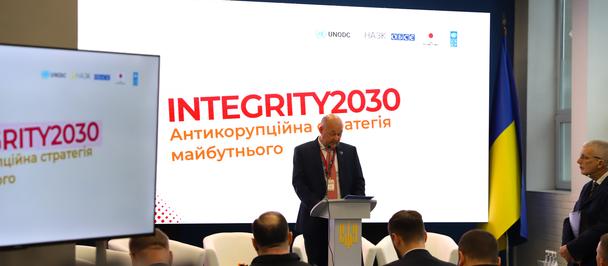UNDP and Dutch government provide Ukrainian police with forensic devices and supplies essential for rapid DNA analysis.
Minutes, not months: High-tech DNA analysis to speed up family reunifications in Ukraine
February 13, 2025

From left to right Christophoros Politis Deputy Resident Representative of UNDP in Ukraine, Alle Dorhout, Dutch Ambassador to Ukraine, Artem Shevchishen, The Deputy Head of the Main Investigative Department of the National Police of Ukraine, Volodymyr Sherstniov, Deputy Head of the Department — Head of the international relations Division, Department of International Police Cooperation, National Police of Ukraine
Kyiv, 13 February 2025 – The United Nations Development Programme (UNDP) in Ukraine, with financial support from the Government of the Netherlands, has donated 250 chips for ANDE portable DNA analysis laboratories, 1,250 ANDE swabs, and 1,150 packs of devices for collection and storage of DNA samples. The support was provided as part of the Strengthening the Capacities of the National Police of Ukraine on the Reunification of Families in Ukraine project.
With the onset of full-scale war, many Ukrainian children have become separated from their families, and their reunification is a pressing and complex issue that often requires the use of DNA identification techniques in pre-trial investigations.
Commenting on the supply of the equipment, Jaco Cilliers, UNDP Resident Representative in Ukraine, emphasized the critical importance of bolstering justice systems and institutions during times of conflict:
"In the face of war, strengthening institutional capacities becomes paramount,” Cilliers said. “This project represents a significant stride in fortifying Ukraine's justice system, particularly in addressing the urgent humanitarian need for family reunification. By enhancing the National Police's technological capabilities and forensic infrastructure, we're not just reuniting families – we're building resilient institutions that can withstand the challenges of conflict.”
“This initiative, supported by the Government of the Netherlands, also exemplifies our commitment to reinforcing Ukraine's ability to protect its most vulnerable citizens, and ensure that all children have the chance to return to their families and homes,” Cilliers added.
Dutch Ambassador to Ukraine Alle Dorhout stressed: “For the Netherlands, countering the deportation of children is a priority. This project has multiple layers, enabling not only the identification of families of forcibly displaced children but also the investigation of war crimes to uphold justice and the rule of law amid Russia’s full-scale invasion of Ukraine. Additionally, it will help prevent future human rights violations and protect the most vulnerable children from forcible displacement,” he said.
The high-tech technology enables a complete DNA profile of a person to be created in just one-and-a-half hours, and the genetic relationships between persons to be established in a matter of minutes. The technology is being used in the search for missing persons and to reunify children with their families.
The Deputy Head of the Main Investigative Department of the National Police of Ukraine, Artem Shevchishen, noted: "The issue of family reunification is extremely urgent. Establishing DNA profiles is critically important, as Russians have been taking children from orphanages and destroying their documents. Therefore, the only evidence of family ties today may be the DNA profile. This is not a quick process, but the police have been gathering all the necessary information since the first days of the war. Thanks to the support of partners, we can use modern technologies for gathering evidence of war crimes, particularly regarding the deportation of children. Such evidence can be used in both national courts and international ones, including the International Criminal Court."
In autumn 2024, 60 forensic investigators from the National Police of Ukraine enhanced their knowledge of high-speed DNA profiling technology through a series of training sessions organized by the National Police of Ukraine, which were supported by UNDP in Ukraine and the Government of the Netherlands.
As of now, the National Police has already been provided with supplies for its ANDE 6C genetic analysis devices, namely 50 type A chips (used in analysing human cheek swabs), and 200 type I chips (used in analysing a wide range of forensic samples, including saliva, blood and other bodily fluids), along with 50,000 devices (systems) for the selection and storage of samples of biological material.
Media enquiries:
Yuliia Samus, Head of Communications, UNDP in Ukraine, yuliia.samus@undp.org

 Locations
Locations



